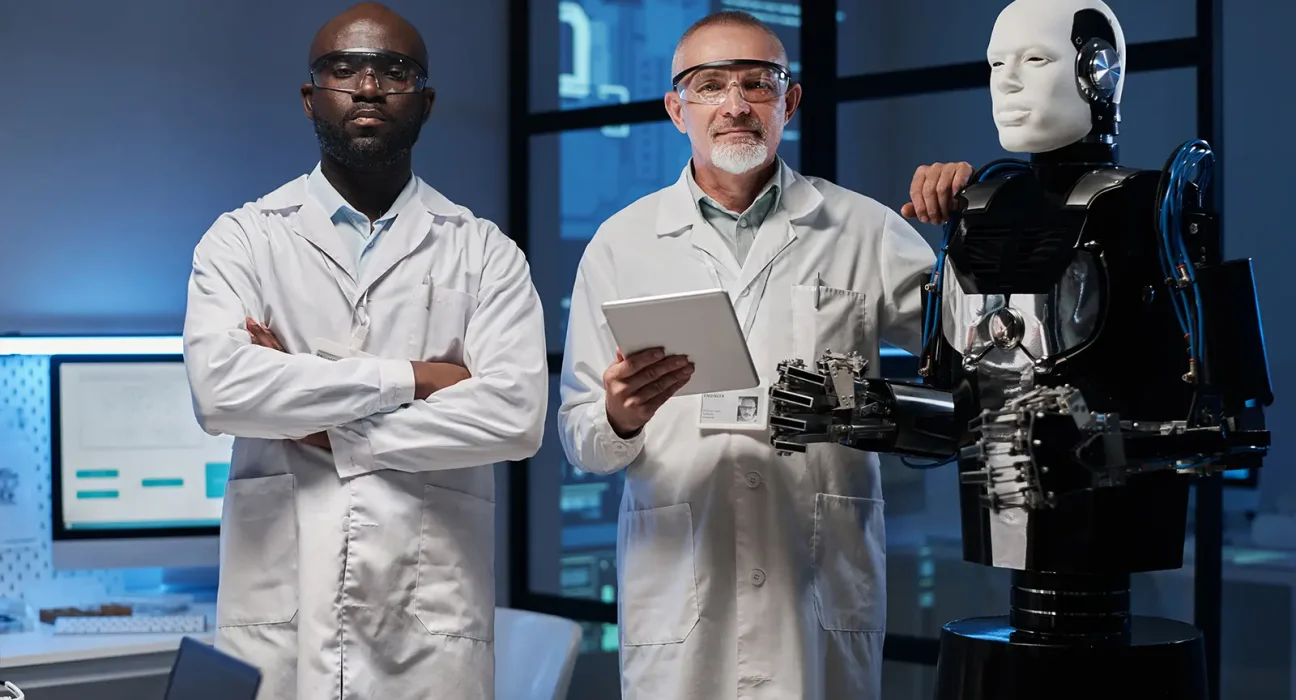How Does Artificial Intelligence Impact Scientific Research?

Artificial intelligence has disrupted many fields, and scientific research is no exception. From data analysis to the prediction of outcomes, AI grants researchers the power to make historic discoveries more effectively and speedily than ever. AI allows science to move faster toward improvements that span medicine and physics to environmental science. Herein, we explore how artificial intelligence is reforming scientific research and its deep impacts on the road of discovery and innovation.
1. Data Analysis and Interpretation in Record Time
Scientific research in today’s world has created mountains of data. AI, therefore, has become quite pivotal because it is capable of processing and analyzing huge amounts of data very fast for scientists.
- Data Mining and Pattern Recognition: AI algorithms go through big datasets and identify patterns that would have otherwise been overlooked by human researchers. In the field of genomics, for example, AI recognizes patterns consisting of gene sequences involved with specific diseases, allowing scientists to develop treatments using those sequences.
- Machine Learning Models: this is one of AI because it lets computers find data so that it improves on experience. By their ability to be trained, machine learning models can forecast the outcomes or classifications, for example, analyzing the astronomical data based on telescopic observations by classifying stars or other celestial bodies.
- Speed and Efficiency: AI-generated data analysis greatly speeds up research that could take months or even years when performed manually. The result of such processing is that researchers are in a position to have more time for interpretation and further experimentation.
Because of its powers of data analysis, AI allows scientists to deal with more complex sets of data, which generally results in quicker discoveries or insights about most scientific matters.
2. Improving Predictive Modeling and Simulations
Predictive modeling is where scientists can forecast the outcomes given the data that they already have. Predictive modeling, in fields that do not allow experimentation or would take too long, has hence revolutionized the approach towards research.
- Drug Discovery: The use of AI-powered predictive models in pharmacology helps scientists simulate how a new compound might interact with the biological target and identifies drugs. This, which previously took years, now has the potential to speed up significantly and to deliver drugs much faster.
- Climate Modeling: AI helps environmental scientists predict patterns in climate and effects on the environment. Analyzing huge environmental data, AI models can even simulate future climate scenarios, hence providing important information for policy-making and environmental protection.
- Engineering and Material Science: Predictive modeling in engineering involves the capability of AI to simulate stress and strain on different materials. It helps researchers develop stronger and more efficient materials for construction, manufacturing, and technology.
With AI, researchers can build realistic, predictive models to simulate scenarios that help them fine-tune experiments and deepen their understanding of complex processes.
3. Transforming Medical Research and Healthcare
Medical research and healthcare have felt the revolutionary force of AI. From diagnosis of ailments to even designing treatment plans based on particularized approaches, AI applications in medicine continue to expand.
- Disease Diagnosis: AI algorithms go through medical imaging data to diagnose diseases related to cancer and neurological conditions. These AI systems assist the doctors by highlighting the diseases at their early stage, which may not be that much possible by the human eye.
- Personalized Medicine: Genomics and molecular biology enable personalized medicine when AI designs personalized treatments based on a genetic profile of a patient. This is precision medicine, if you will, giving focused therapy that will enhance patients’ outcomes.
- AI in Drug Development and Clinical Trials: AI accelerates the process of drug discovery through the identification of promising compounds and predictions about how they will interact with the human body. AI facilitates the efficiency of clinical trials by better matching patients with suitable studies, hence improving the likelihood of successful outcomes.
AI use in medical research has allowed for quicker diagnosis, better treatment methods, and the discovery of drugs that can save lives.
4. Helping Advance Environmental Science and Conservation
AI can enable research into climate change, biodiversity, and conservation in environmental science. AI will be helpful for analysis of environmental data to predict ecological impacts, hence helping solve some of the global environmental problems.
- AI in Wildlife Conservation: It processes data acquired from sensors, cameras, and drones that track wildlife populations and trace the movements of endangered species. In this respect, therefore, automation would allow researchers to monitor animal behavior and habits, without intrusion methods, and come up with more effective conservation ways.
- Monitoring Pollution: AI analyzes air and water quality data to recognize patterns and sources of pollution. This information assists governments and organizations in taking proactive steps against pollution, ensuring protection for the public’s health.
- Research on Climate Change: Artificial intelligence-powered models analyze meteorological trends, sea currents, and other ecological data to foresee climate changes. This research is very crucial in comprehending the various potential changes that global warming might bring about in ecosystems and even human populations.
Saliently, AI can enable environmental scientists to gather and interpret data in such a way that evidence-based decisions are made on issues of conservation and sustainability.

5. Enhancement of Research in Physics and Astronomy
AI is quite broad in scope of application in physics and astronomy, especially in regions where it all deals with the collection and analysis of data. AI allows researchers to obtain an understanding of the universe by filtering the huge volumes of data emanating from telescopes, satellites, and sensors.
- Space Exploration: AI helps in the planning and execution of space missions and data analysis from rovers and satellites. What’s more, it’s engaged in the search for potential exoplanets and the study of cosmic phenomena like black holes and supernovae.
- Particle Physics: Artificial intelligence interprets data from collision in particle accelerators to discover new particles and understand their behaviors. Thus, algorithms in machine learning are very important to be able to process and categorize data which a human cannot do.
- Quantum Computing and Simulation: The ability of AI will also help in optimizing algorithms used in simulating quantum interactions. These developments have their applications in cryptography up to material science.
Automation in processing data and refining simulations: AI allows physicists and astronomers to study the universe by analyzing the tiniest pieces of the fundamental forces involved.
6. Accelerating Chemistry and Material Science
Artificial Intelligence has accelerated innovation in the fields of chemistry and materials science by enabling researchers to design new materials, predict chemical reactions, and optimize compound combinations.
- Material Discovery: AI models simulate how various materials will act under variant conditions to assist scientists in developing advanced materials suitable for aerospace engineering or the production of renewable energy.
- Chemical Synthesis: AI predicts chemical reaction yields and, therefore, helps chemists synthesize new compounds easier and much faster. This is quite handy in the development of new medicines and sustainable chemical processes.
- Catalyst Design: AI designs catalysts that will serve to speed up chemical reactions and use less energy. This, in turn, will have great consequences for manufacturing and energy production.
The contribution of AI to material science and chemistry will lead to the development of sustainable technologies and make it possible for eco-friendly solutions to be developed both for industry and energy.
7. Overcoming Challenges and Ethical Considerations
Despite the transformative power of AI in scientific research, a host of challenges and ethical issues pervades it.
- Data Privacy: For instance, in healthcare and genomics, many critical issues protect patient data and privacy. Researchers should set up secure data management practices that safeguard sensitive information.
- AI Model Biases: Sometimes, the algorithms developed using artificial intelligence may reflect the biases of the knowledge base from where they are trained. Fair and unbiased AI systems ensure the dependability of scientific research.
- Human Oversight: Even though AI enhances scientific research, human judgment is required for interpretation of results and to avoid errors. AI should augment human researchers, not replace them.
Meeting these challenges will ultimately help ensure that the influence of AI on scientific research serves the greater good while taking an ethical course of action.
Conclusion
Artificial intelligence is reconstructing scientific research by making it ever faster, more accurate, and more accessible. From medical diagnosis to environmental conservation, AI has become ubiquitous. It allows scientists to accelerate data processing, make predictive models, and improve precision in experiments necessary to tackle complex global humanity issues.
While AI technologies are continuously improved, it will continue to play a bigger role in scientific research, opening new horizons for discovery and innovation. However, responsible use and ethical consideration will provide the best benefit of AI and will permit bypassing the limitations it may have. It is thus in the combination of AI with human creativity and insight that we can go further in pushing the boundaries of science and increasing our knowledge about the world around us.
Read also: How Practicing Mindfulness Can Enhance Your Physical and Mental Well-being











